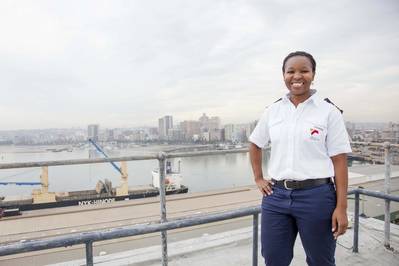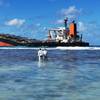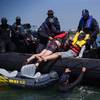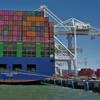One of the first three women in Africa to obtain a Marine Pilot open license in 2011, Pinky Zungu has again made history with her appointment as Transnet National Ports Authority’s first black female Deputy Harbor Master – Nautical for the Port of Durban.
Having been selected by TNPA as a development candidate in 2001, Zungu is one of a growing number of women who have been promoted into senior positions through their hard work and dedication, who are changing the face of the male dominated maritime industry.
A week after obtaining her open license in 2011, Zungu was in the spotlight when she piloted the MSC Chicago, at the time the largest container vessel to visit South Africa’s shores. This was just after the entrance channel had been widened to make way for a new generation of container ships. She has since had seven years’ experience of guiding vessels of any size up to super tankers and mega container vessels into the Port of Durban, putting her in an ideal position to take on her new role.
As Deputy Harbor Master – Nautical, one of her key responsibilities will be managing the marine pilots under her wing. These include a number of young black women, as TNPA’s efforts to provide opportunities for the historically disadvantaged, including women, continue to gain traction.
“Being a marine pilot is a huge responsibility. You have to study the sounding charts daily and have an accurate mental picture of the seabed. You have to know what’s underneath you including port depths, as the equipment on board the visiting ships doesn’t always work,” Zungu explained.
“When you bring in a vessel you take over from the captain and all the decision making is up to you. It’s you and the ship. You are on your own and it can be stressful as you are piloting someone else’s vessel. While the new container ships and auto carriers are extremely responsive and the cruise liners even more so, some vessels (usually bulk carriers and tankers) are underpowered. You have to be prepared for any emergency including engine failure and other factors beyond your control, such as a sudden change in the weather.”
Zungu is excited by the opportunity to bring change and to encourage and mentor newly graduated pilots. “I have the technical hands-on experience to provide guidance and assurance. From this position I will also have an overall view of what is required to ensure safe operations,” she added.
Born and raised in Lamontville, Zungu’s original dream was to be an air pilot, but her parents could not afford the training. She signed up to do Maritime Studies at the Durban University of Technology when she realized that if she worked on ships she could go all over the world for free.
“I didn’t realize that this came at a price. While I got to see most of Europe and West Africa during my cadetship with Unicorn, I spent the first eight months on a bulk carrier as the only woman in a crew of 28 Russian men. The only person who could speak a little bit of English was the captain.
“It’s a tough environment for women. On board you have to have the physical and mental strength to perform the role. Only when you’re on land you can put on your skirt and heels and be a lady again,” cautions Zungu.
After her cadetship Zungu completed a compulsory oral examination with the South African Maritime Safety Authority (SAMSA) to obtain a Class 3 ticket to be a junior deck officer responsible for auto piloting vessels and managing safety equipment.
She then trained and worked as a tug master at TNPA maneuvering ships in and out of the port with the aid of small tugboats. Zungu then completed a one year pilot training program to qualify as a junior pilot before progressing through the various license grades, starting with smaller ships of around 16,000 gross tons, then 20,000, 25,000 and 35,000 before qualifying for her open license.
In her new role as Deputy Harbor Master - Nautical, in addition to managing marine pilots, other responsibilities include close liaison with the dredging department, incident management, ensuring vessels carrying Dangerous Goods comply with control measures, and ensuring the safety of the port. It includes understanding of the international regulations and conventions and once these are adopted by SAMSA, the port complies accordingly.
A mother of three, Zungu has achieved her career success with the support of her husband, a Senior Lifeguard at the eThekwini Municipality who grew up with her in Lamontville.











